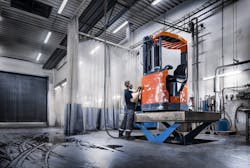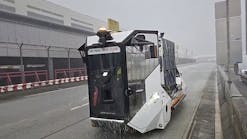On-Going Global Supply Chain Issues Prompt Upsurge in Used Forklift Demand as Buyers Opt for ‘Blended Fleets’
With ongoing global supply chain issues leading to longer lead times for all types of new materials handling equipment, Toyota Material Handling UK (TMHUK) reports that demand for its pre-owned forklifts is at an all-time high as truck users look to second- or third-life machines to support their fleets.
“With refurbished models available for immediate delivery, we are seeing a significant increase in the number of companies that opt for ‘blended’ fleets – a mix of new and used machines,” says Stuart Reilly TMHUK rental and used director.
He continues: “For example, a customer with a requirement for 30 counterbalance trucks may take delivery of 25 new forklifts and, rather than waiting for the remaining five new trucks to be built and delivered, will prefer to obtain five used models straightaway on a short-term rental agreement.”
The strong demand for used equipment comes at a time when the number of second-life units available to rent or buy is down on previous years across the UK market.
Reilly explains: “Most facilities where forklifts operate were considerably less active than normal for a period of 18 months or so at the height of the COVID pandemic crisis. As a result, many truck fleets that are now coming to the end of their primary term contract hire period have not been worked as hard as expected, so users are seeking to extend the length of their contract for an extra year or 18 months.
“Fewer returning trucks means a reduction in the number of machines available to enter the next phase of the ‘rental cycle’.”
Because around 80 per cent of all new forklifts are acquired on some form of contract rental agreement every manufacturer or dealer knows that almost every new truck ‘sold’ will eventually come back into the business when it reaches the end of its rental period. This allows manufacturers and dealers to plan ahead accordingly.
But, the unique market conditions that have been created by the pandemic mean that many manufacturers and dealers now find that fewer trucks than expected are returning to be ‘re-worked’ and added to their used equipment or short term rental fleets.
Reilly believes the current situation could take around two years to resolve and is a potentially significant problem for those manufacturers and dealers that lack scale and significant market share. It will have less impact on the biggest players in the forklift market thanks to the sheer numbers of trucks that they supply.
“Thankfully, because of the volume of new Toyota lift trucks that enter the market each year we have no used truck availability issues” he explains.
Approved Used Toyota trucks for the UK market are refurbished to the highest standards at the company’s Fleet Management Centre in Leicestershire.
Machines are fully inspected and any necessary repairs are carried out, including replacing all worn or defective parts - including tires and lift chains. The trucks are fully valeted and repainted before being reassembled and safety tested.
Over 95 percent of the new Toyota lift trucks that enter the European market are manufactured at factories in Sweden, France and Italy and all models are produced according to the principles laid out in the globally renowned Toyota Production System (TPS). Developed in the 1950s, the TPS management system eliminates waste and inconsistency during the production process to deliver products that are built with the highest levels of quality assurance.
Throughout each truck’s life Toyota has 100 per cent visibility of all parts – including the engine and transmission – so the company knows the complete history of every machine that comes back into the business.
“Knowing the history of every truck and the fact that we only use Toyota components and parts during the refurbishment process, means that we can guarantee that our fully refurbished forklifts will give many years of efficient and productive service,” says Reilly
He adds: “Our aim is to help clients manage their forklift cost base effectively and if we can demonstrate that switching all or a percentage of the fleet to used trucks offers cost benefits without sacrificing productivity or safety, then clients are more than happy to embrace refurbished trucks into their fleet.”





